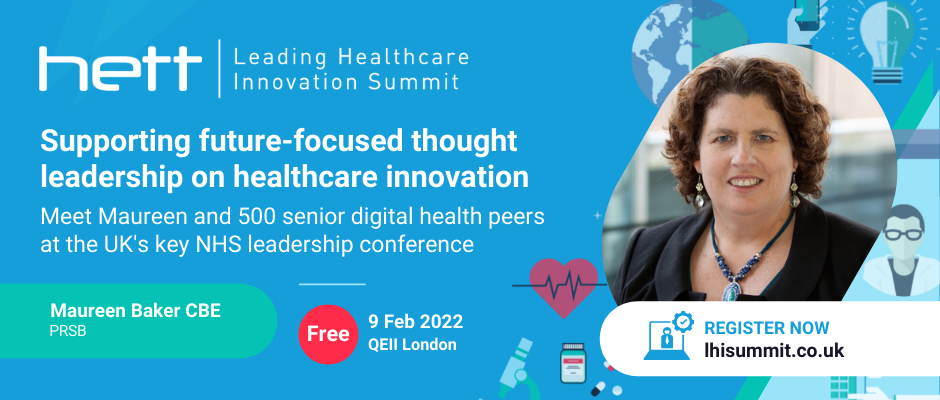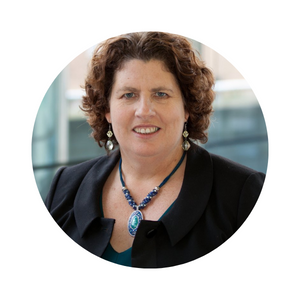We sat down with GP and Chair of the PRSB Dr Maureen Baker CBE to discuss the upcoming her journey into Digital Health, how we can ensure we prioritise Patient Safety and the upcoming Leading Healthcare Innovation Summit.
HETT: First of all, thanks for sitting down with us Maureen. To begin, please tell us a little about about your journey into digital healthcare - what was your route into the sector?
Maureen Baker: "I previously worked as a GP and was the former chair of the Royal College of GPs. In my medical roles, I championed quality improvement and better safety standards through the use of digital clinical information, which I feel is necessary to do the job to the highest standard and ease the workload within the profession. I then became the chair of the PRSB in 2017” HETT: Taking all of that experience into consideration, what would you say is the most crucial factor to improving the quality of delivering better patient care and safety?
HETT: Taking all of that experience into consideration, what would you say is the most crucial factor to improving the quality of delivering better patient care and safety?
Maureen Baker: "Information standards have a significant role to play in improving care. GPs’ work depends on the information they receive from other care providers, particularly hospitals and pharmacies.
It is common to receive many physical letters from hospitals that contain duplicate information or are missing the important patient information needed to administer care. Digital standards allow for this crucial information to be stored securely and consistently in a standardised format, that can then be easily shared across health and care digital systems.
This means, when a patient is transferred from secondary to primary care, GPs have all their details – an up-to-date medications list, a summary of their diagnosis, treatment, and care in hospital, and any actions or follow up tests I need to take arrange following a stay in hospital – all available to me to make safe, fully informed decisions about that person’s care."
HETT: Tell us about your perspective on the criticality of standards in interoperability within healthcare in the current environment, considering the policy and funding available to organisations who need to implement them?
Maureen Baker: “The NHS Long Term Plan makes standards a clear priority, stating that they should be mandated and rigorously enforced to ensure data is interoperable, which means it can be shared between digital systems without loss of meaning.
Standards are the foundation for interoperability. We know that without information standards implemented across health and care, data cannot effectively travel between the different digital systems in the sector and thus interoperability cannot happen. Therefore, all digital transformation goals that rely on the development of interoperability also rely on the meaningful development and widespread use of standards, from national Shared Care Records to digital medicines optimisation.
NHSX’s Standards and Interoperability team are doing great work to forward the agenda and we are looking forward to the publication of their strategy.”
HETT: Adapting to new systems to support staff can be a challenge due to capacity. How do you think organisations can tackle this?
Maureen Baker: “It is no secret that health and care professionals are extremely busy and under great pressure, and learning how to use a new digital product or program can seem like just another administrative task they don’t have time for. However, when adopted, information standards actually save time.
Instead of having to physically write and rewrite patient notes, professionals enter this information once into a digital record and they can be assured that this information is safely stored and transferrable within minutes, giving them more time to care.
Furthermore, support for implementation should accompany the development of every new system or digital product. PRSB’s standards are accompanied by implementation guidance that takes the health or care provider through each step for adopting our standards.
We will shortly be publishing our Community Mental Health Toolkit, developed in consultation with two mental health trusts, which takes a provider through everything necessary to adopt our care planning standard for mental health care use.”
HETT: How will the formalisation of ICSs with ICBs change the way healthcare systems approach interoperability and integrated care?
Maureen Baker: “From April, ICSs will be responsible for coordinating care through partnerships with a range of health and care providers and they aim to deliver services organised around the individual rather than leaving people to navigate organisational boundaries themselves.
Achieving full interoperability will be crucial as ICSs mature, as a person’s information will need to be shareable between many more providers. For example, NHSX’s What Good Looks Like Framework says that organisations should contribute data to the ICS-wide shared care record in line with PRSB’s Core Information Standard.
Developing a comprehensive Shared Care Record that pulls data from several systems, records and providers will allow ICSs to organise integrated care effectively."
HETT: With the return of HETT’s Leading Healthcare Innovation Summit, what would you like to see discussed to support future-focused thought leadership on healthcare innovation?
Maureen Baker: “I’m looking forward to discussing the future of medical wearables and the self-directed patient, which I believe will be of huge importance in the coming years. In many ways, we are all already self-directed patients as we use our phones and other electronic tools to track our steps, sleep, and other health measurements every day.
As more medical wearables get official government approval, this is only set to increase so it’s vital that, as the medical profession, we harness these tools for safe and responsible care and guard against their dangers.”
HETT: We're also extremely excited to see what's new in the world of wearables next month at LHIS! Our final question is: to aspiring digital healthcare professionals, what would you advise them when approaching digital healthcare industry and how would you encourage them to use their energy to make a real difference?
Maureen Baker: “As I entered this sector as a clinician, I would tell fellow medical professionals interested in digital healthcare that their clinical background is their biggest strength. You have a wealth of experience and evidence built up through your work on the frontline, which can be used to improve the technology we all share – use it!”
HETT: It's been great talking to you, Maureen. We'll look forward to seeing you at the Leading Healthcare Innovation Summit!
Supporting future-focused thought leadership on healthcare innovation
In the dawn of a new era for digital and health tech transformation, we are thrilled to invite you to the HETT Leading Healthcare Innovation Summit (QEII Centre London, 9th February 2022) an event designed to support future-focused thought leadership on healthcare innovation.
The CPD-certified conference will bring together a senior audience from across the NHS and the wider digital healthcare landscape to address some of the sector’s biggest challenges and concerns.
Organisations such as NHS Digital, NHSX, The AHSN Network and The Chartered Institute for IT (BCS) support the conference and its insightful agenda which will cover three key topics including Remote Care, Integrated Care Systems , and Patient-Centred Design. We will deep dive into topics such as the mental health of clinicians and patients, clinical pathways, diversity and inclusion in data and products, service and user inclusive design, setting up and implementing remote patient monitoring, virtual consultations, ICS leadership development, and population health management.
This is more than just a conference, it’s an experience that delivers a positive impact on your projects, teams and patients.

%20(1).png?width=500&height=58&name=HETT%20insights%20logo%20RGB-04%20(1)%20(1).png)

